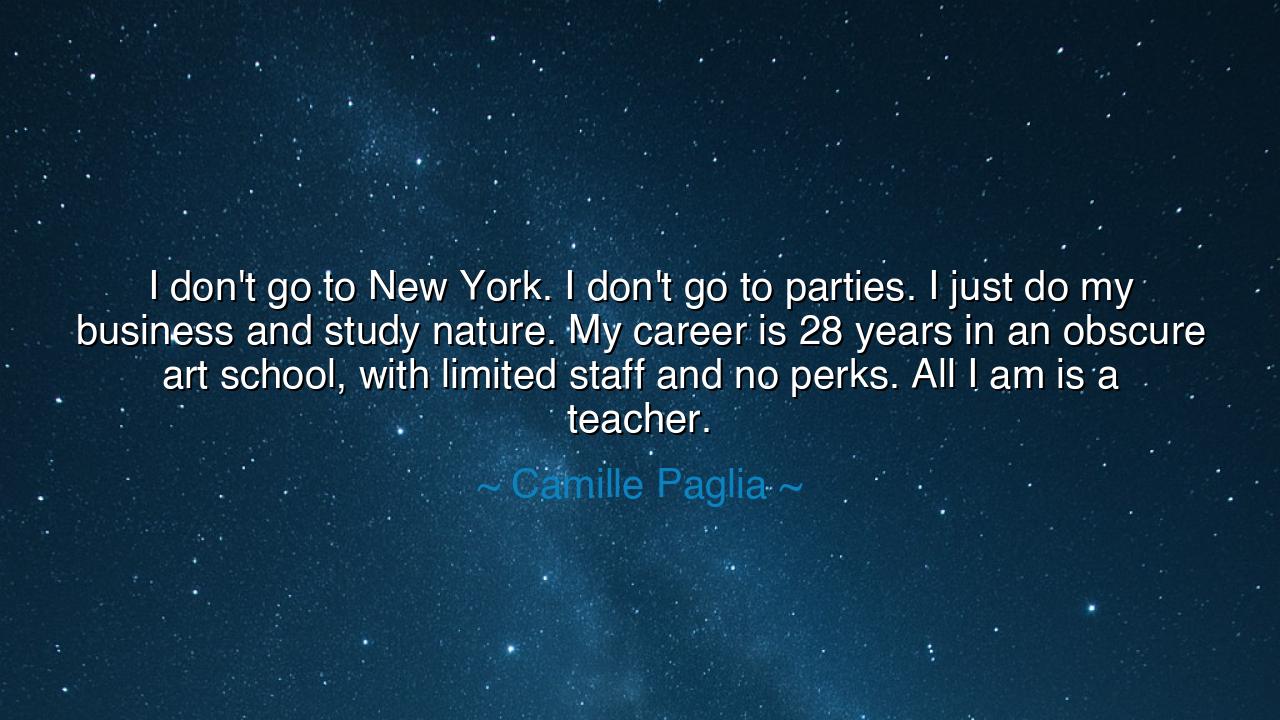
I don't go to New York. I don't go to parties. I just do my
I don't go to New York. I don't go to parties. I just do my business and study nature. My career is 28 years in an obscure art school, with limited staff and no perks. All I am is a teacher.






Listen well, O seeker of truths, and let the words of Camille Paglia resound through the corridors of your mind: "I don't go to New York. I don't go to parties. I just do my business and study nature. My career is 28 years in an obscure art school, with limited staff and no perks. All I am is a teacher." Herein lies a meditation on the essence of vocation, the quiet dignity of commitment, and the profound rewards of a life devoted not to fame or glory, but to the steadfast pursuit of knowledge and the cultivation of minds. In these words, the ancients would recognize the virtues of discipline, humility, and purpose, extolled in their scrolls as the pillars of a meaningful life.
Paglia’s declaration springs from a life devoted to the sublime act of teaching, yet one performed in a realm often overlooked by the world: an obscure art school, distant from the bustling lights of New York, far from the seductions of social acclaim. Her career, spanning 28 years, is a testament to endurance and focus, qualities revered by the sages. She teaches not for fanfare, nor for the ephemeral applause of society, but to illuminate the inner landscapes of her students, guiding them to see, understand, and feel the mysteries of nature and art.
Consider the weight of such devotion: to forgo parties, to resist the siren call of glamour, to work with limited staff and no perks—this is the mark of one who places the work itself above all else. History provides many companions to Paglia’s path: Socrates walking barefoot through the Athenian agora, Plato in the gardens of the Academy, or Confucius teaching with tireless patience in the villages of ancient China. They did not seek the adulation of kings or the attention of crowds; they sought only to cultivate wisdom and to guide those who would learn.
O listener, hear the courage within Paglia’s words: a life of quiet rigor, of study and observation, often goes unnoticed by the world, yet it yields treasures beyond measure. In her commitment to study nature, she aligns herself with the timeless rhythm of existence, observing the patterns, flows, and truths that govern life itself. Like Leonardo da Vinci in his humble studio, sketching endlessly, measuring, observing, and learning, she demonstrates that the pursuit of knowledge and understanding is itself a form of glory—not the glory of applause, but of mastery and insight.
A real-life reflection of this path can be seen in the story of Maria Sibylla Merian, a 17th-century naturalist and artist, who devoted her life to studying insects and plants. She shunned the social gatherings of her peers and the courts of Europe, choosing instead to observe, illustrate, and teach. Her work, initially obscure, became invaluable to generations that followed, a reminder that the labor of dedication, even when unrecognized in its time, shapes the world profoundly. Paglia, too, embodies this truth: all she is, all she has chosen to be, is a teacher, and that alone is her enduring legacy.
Through her words, Paglia imparts a lesson for all who strive for purpose and meaning: do not measure your life by the approbation of society, nor by the glitter of social spectacle. Instead, anchor yourself in your calling, dedicate yourself fully to your craft, and allow the discipline of study to sculpt your soul. True mastery, true contribution, is born not in fleeting moments of attention, but in the steady, unbroken labor of one who loves the work itself.
Practical actions, O seeker, flow naturally from this teaching. Identify the work that calls to your spirit. Pursue it with unwavering focus, even if the path is lonely or the world fails to notice. Resist the distractions of vanity, gossip, and superficial allure. Observe nature, humanity, and your chosen art with patience and curiosity. Share what you have learned as a teacher, mentor, or guide, not for reward, but for the profound joy of illuminating minds and hearts.
Thus, let Camille Paglia’s words remain inscribed upon your inner tablet: to live a life of quiet dedication, to embrace the obscure and humble, is no small thing. In forsaking the glittering crowd for the noble task of teaching, she achieves a greatness that transcends celebrity and social acclaim, a greatness measured in the eternal currency of knowledge, influence, and wisdom, passed gently from one generation to the next.






AAdministratorAdministrator
Welcome, honored guests. Please leave a comment, we will respond soon